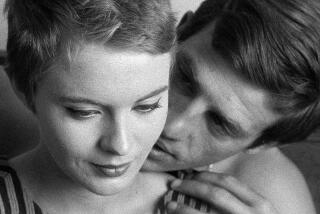BOOK REVIEW : An Intellectual Puzzle That’s Fun to Read : INTO THE BLUE, <i> by Robert Goddard</i> . Poseidon Press, $19.95, 416 pages
- Share via
“Resentment” is the most often repeated word in this book.
When first we meet Harry Barnett, a middle-aged, overweight, semi-alcoholic Englishman, pottering about as a caretaker on the Greek island of Rhodes, Harry has almost completely banked his smoldering resentment under the cooling ash of glass after glass of retsina, long evenings in smoky tavernas, and the physical beauty of the villa he takes care of.
Harry may be a failure, but he’s almost succeeded in forgetting how and why he has landed in this lovely but Godforsaken spot.
Then a pretty woman named Heather Mallender comes to visit the villa as a guest of its owner, distinguished Member of Parliament Allan Dysart.
Heather comes alone--Dysart is home in London, busily pursuing his career. For the first time in eight years, Harry’s gloomy loneliness is broken.
He makes friends with Heather. Then, on a visit to the high mountain reaches of Profitis Ilias--a scenic but spooky spot on the island, Heather vanishes into thin air. Harry becomes a prime suspect, if only for awhile.
All of his self-hatred, grinding insecurity and seething resentment flame back into life. Harry awakes from an eight-year emotional slumber.
This is not the first fateful run-in he’s had with the Mallender family.
They run a shipping-supply factory back home. Harry worked there once, long ago, and was fired for having his hand in the till, except that the person who was really stealing from Mallender Marine was the odious Roy Mallender, the boss’ son and an awful man.
As a kind of polar opposite to the cruelty of the Mallender family, Harry owes his last eight years of sinecure on the island of Rhodes to that Allan Dysart, who, ironically, once worked for him at a car dealership, and who has been a continuing presence in Harry’s life, though, if he thinks about it, Harry doesn’t quite know why.
Heather is dead, or missing. Harry--absently, offhandedly--picks up a last set of photographs she left at a local store to be developed. The roll of film is essentially a set of clues that begin back in England and lead to Rhodes.
Harry, precisely because he has nothing to lose, decides to follow these photographic clues.
Heather’s disappearance isn’t the only fishy thing that’s happened. Heather had a sister--yet another Mallender sibling--who worked as personal assistant to Allan Dysart and was recently blown sky high by IRA terrorists.
Did Heather know too much about her sister’s death?
Harry comes home to England, to his crabby mother, his moth-eaten home and his unsavory, undistinguished past. He’s been swindled, made a fool of, far more than once, and people greet him familiarly as both a boozer and a buffoon.
But “Into the Blue” functions as an adult and sophisticated “Wizard of Oz” parable. As Harry searches, he finds his own courage, wit, generosity. And, satisfyingly, those who have patronized and swindled him in the past come to hideously bad ends.
The jacket blurb compares Robert Goddard to both John Fowles and Daphne DuMaurier, which seems schizophrenic at first, but turns out to be right on the money.
This is a suspenseful romance, with clue after clue after clue, and hidden pasts, and strings of murders, but all of it is very smart, very complex--profound without being pretentious.
We all have different sets of lives, Goddard’s novel suggests: We may be a hero in one context and a villain in another; both a failure and a success--either in layers or simultaneously.
Earlier lives, that we think we may have completely grown out of, stay with us forever. We carry our pasts always, whether we know it or not.
“Into the Blue” is fun to read as an intellectual puzzle. Beyond the narrative, you sense the author’s own immense pleasure in putting this stuff together, concocting surprise after surprise, dealing out destinies, pasting together coincidences, playing jokes on the humans in his novel like a genuine literary Greek god.
Next: Charles Johnson reviews “Anarchy and Elegance” by Chris Goodrich (Little, Brown).
More to Read
Sign up for our Book Club newsletter
Get the latest news, events and more from the Los Angeles Times Book Club, and help us get L.A. reading and talking.
You may occasionally receive promotional content from the Los Angeles Times.










